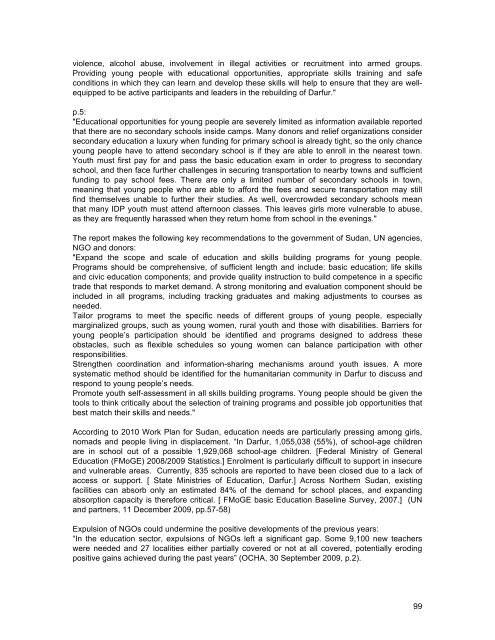SUDAN: Durable solutions elusive as southern IDPs return and ...
SUDAN: Durable solutions elusive as southern IDPs return and ...
SUDAN: Durable solutions elusive as southern IDPs return and ...
Create successful ePaper yourself
Turn your PDF publications into a flip-book with our unique Google optimized e-Paper software.
violence, alcohol abuse, involvement in illegal activities or recruitment into armed groups.<br />
Providing young people with educational opportunities, appropriate skills training <strong>and</strong> safe<br />
conditions in which they can learn <strong>and</strong> develop these skills will help to ensure that they are wellequipped<br />
to be active participants <strong>and</strong> leaders in the rebuilding of Darfur."<br />
p.5:<br />
"Educational opportunities for young people are severely limited <strong>as</strong> information available reported<br />
that there are no secondary schools inside camps. Many donors <strong>and</strong> relief organizations consider<br />
secondary education a luxury when funding for primary school is already tight, so the only chance<br />
young people have to attend secondary school is if they are able to enroll in the nearest town.<br />
Youth must first pay for <strong>and</strong> p<strong>as</strong>s the b<strong>as</strong>ic education exam in order to progress to secondary<br />
school, <strong>and</strong> then face further challenges in securing transportation to nearby towns <strong>and</strong> sufficient<br />
funding to pay school fees. There are only a limited number of secondary schools in town,<br />
meaning that young people who are able to afford the fees <strong>and</strong> secure transportation may still<br />
find themselves unable to further their studies. As well, overcrowded secondary schools mean<br />
that many IDP youth must attend afternoon cl<strong>as</strong>ses. This leaves girls more vulnerable to abuse,<br />
<strong>as</strong> they are frequently har<strong>as</strong>sed when they <strong>return</strong> home from school in the evenings."<br />
The report makes the following key recommendations to the government of Sudan, UN agencies,<br />
NGO <strong>and</strong> donors:<br />
"Exp<strong>and</strong> the scope <strong>and</strong> scale of education <strong>and</strong> skills building programs for young people.<br />
Programs should be comprehensive, of sufficient length <strong>and</strong> include: b<strong>as</strong>ic education; life skills<br />
<strong>and</strong> civic education components; <strong>and</strong> provide quality instruction to build competence in a specific<br />
trade that responds to market dem<strong>and</strong>. A strong monitoring <strong>and</strong> evaluation component should be<br />
included in all programs, including tracking graduates <strong>and</strong> making adjustments to courses <strong>as</strong><br />
needed.<br />
Tailor programs to meet the specific needs of different groups of young people, especially<br />
marginalized groups, such <strong>as</strong> young women, rural youth <strong>and</strong> those with disabilities. Barriers for<br />
young people’s participation should be identified <strong>and</strong> programs designed to address these<br />
obstacles, such <strong>as</strong> flexible schedules so young women can balance participation with other<br />
responsibilities.<br />
Strengthen coordination <strong>and</strong> information-sharing mechanisms around youth issues. A more<br />
systematic method should be identified for the humanitarian community in Darfur to discuss <strong>and</strong><br />
respond to young people’s needs.<br />
Promote youth self-<strong>as</strong>sessment in all skills building programs. Young people should be given the<br />
tools to think critically about the selection of training programs <strong>and</strong> possible job opportunities that<br />
best match their skills <strong>and</strong> needs."<br />
According to 2010 Work Plan for Sudan, education needs are particularly pressing among girls,<br />
nomads <strong>and</strong> people living in displacement. “In Darfur, 1,055,038 (55%), of school-age children<br />
are in school out of a possible 1,929,068 school-age children. [Federal Ministry of General<br />
Education (FMoGE) 2008/2009 Statistics.] Enrolment is particularly difficult to support in insecure<br />
<strong>and</strong> vulnerable are<strong>as</strong>. Currently, 835 schools are reported to have been closed due to a lack of<br />
access or support. [ State Ministries of Education, Darfur.] Across Northern Sudan, existing<br />
facilities can absorb only an estimated 84% of the dem<strong>and</strong> for school places, <strong>and</strong> exp<strong>and</strong>ing<br />
absorption capacity is therefore critical. [ FMoGE b<strong>as</strong>ic Education B<strong>as</strong>eline Survey, 2007.] (UN<br />
<strong>and</strong> partners, 11 December 2009, pp.57-58)<br />
Expulsion of NGOs could undermine the positive developments of the previous years:<br />
“In the education sector, expulsions of NGOs left a significant gap. Some 9,100 new teachers<br />
were needed <strong>and</strong> 27 localities either partially covered or not at all covered, potentially eroding<br />
positive gains achieved during the p<strong>as</strong>t years” (OCHA, 30 September 2009, p.2).<br />
99
















